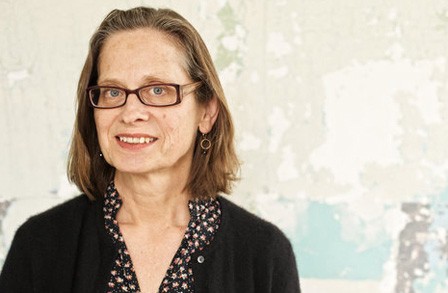Columbia Libraries Acquires Papers of Author Lydia Davis

Columbia University Libraries’ Rare Book and Manuscript Library has acquired the papers of American author Lydia Davis, a recipient of the Man Booker International Prize, MacArthur and Guggenheim fellowships, and a 1970 alumna of the University’s Barnard College. Davis has published six collections of fiction, two of which were nominated for the National Book Award and the PEN/Hemingway Award. She will release a two-volume compilation of essays with Farrar, Straus and Giroux in 2019 and 2020.
Her archive features corrected drafts of her 2004 novel, The End of the Story, and stories, personal correspondence and journals dating back to her adolescence, as well as notes and drafts relating to her translation projects and her 35 years of teaching.
Highlights from the collection include: manuscript drafts and page proofs of works like Break It Down, a 1986 PEN/Hemingway Award finalist; annotated manuscripts of her translations of Flaubert’s Madame Bovary and Proust’s Swann’s Way; 90 personal journals and notebooks written between 1960 and 2009; and 500 pages of letters from friends and colleagues, including other writers.
Proust 2019 Conference
The Lydia Davis Papers are an especially significant addition to the Rare Book and Manuscript Library’s (RBML) archival collections because of her stature as a highly acclaimed contemporary writer and translator and her ties to the Columbia community. Over the course of her career, Davis has amassed both academic and critical praise and an impressive following among generations of readers, championing the form of the very-short story that fits neatly into our current cultural obsession with social media.
Matthew Hart, an associate professor of English and Comparative Literature at Columbia, said of Davis’ experimentation with narrative and form that she “explodes our common sense of what a short story could be… It’s a form perfectly attuned to our age of 140-character compositions. I won’t claim Lydia Davis invented the rhetorical form of the tweet or the Facebook post, but she certainly got there before the rest of us.”
Coupled with her lasting prominence in the contemporary literary canon, Davis’ mastery of form and genre make her an important figure among the distinguished collections of the RBML. The acquisition of her papers complements its existing archival collections, which includes novelists such as fellow Barnard alumna Erica Jong (BC’63).
Davis’ extensive work as a translator from French to English, particularly of Maurice Blanchot, Michel Leiris, Michel Butor, Flaubert and Proust, as well as her translations from other languages including Dutch and German, are likewise noteworthy and contribute to the library’s growing archival collections from literary translators. Sean Quimby, director of the Rare Book and Manuscript Library, observed, “If Davis’ works are marked by quiet precision, her archive allows us to hear the thoughts and afterthoughts that went into their creation.”
Asked to reflect on Columbia’s acquisition of her papers, Davis said, “I am very pleased that my archives have found a safe haven at Columbia. It is especially meaningful to me not only because of the prestige and distinction of the University, but also because of my long association with Columbia, which goes back to the year my father, Robert Gorham Davis, joined the English Department. I grew up frequenting the campus, later attended Barnard College, taught at the School of General Studies, and have made periodic campus visits since, for classes, lectures and readings. That my papers should complete the circle in this way, returning permanently to Morningside Heights, could not be more fitting or gratifying to me.”
On Wednesday, March 13, Davis will deliver the Trilling Lecture at Columbia’s Heyman Center for the Humanities.
According to Nicholas Dames, Theodore Kahan Professor of Humanities, Davis “will be regarded as one of the handful of truly significant American writers at the turn of the millennium… literary historians will be reckoning with her influence for decades to come, and her papers will be much sought after as a result.”
Researchers will have the opportunity to consult the Davis archive when it has been cataloged in late 2019